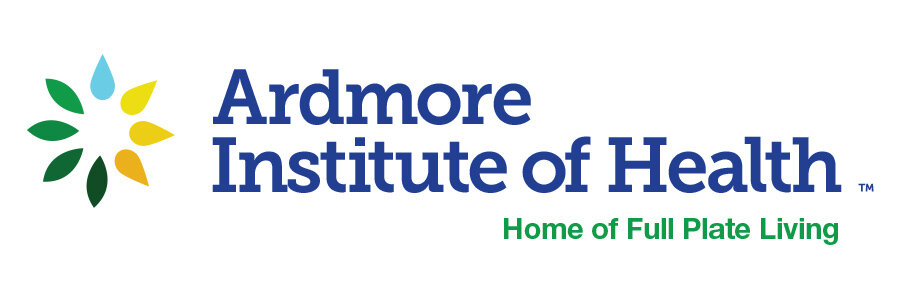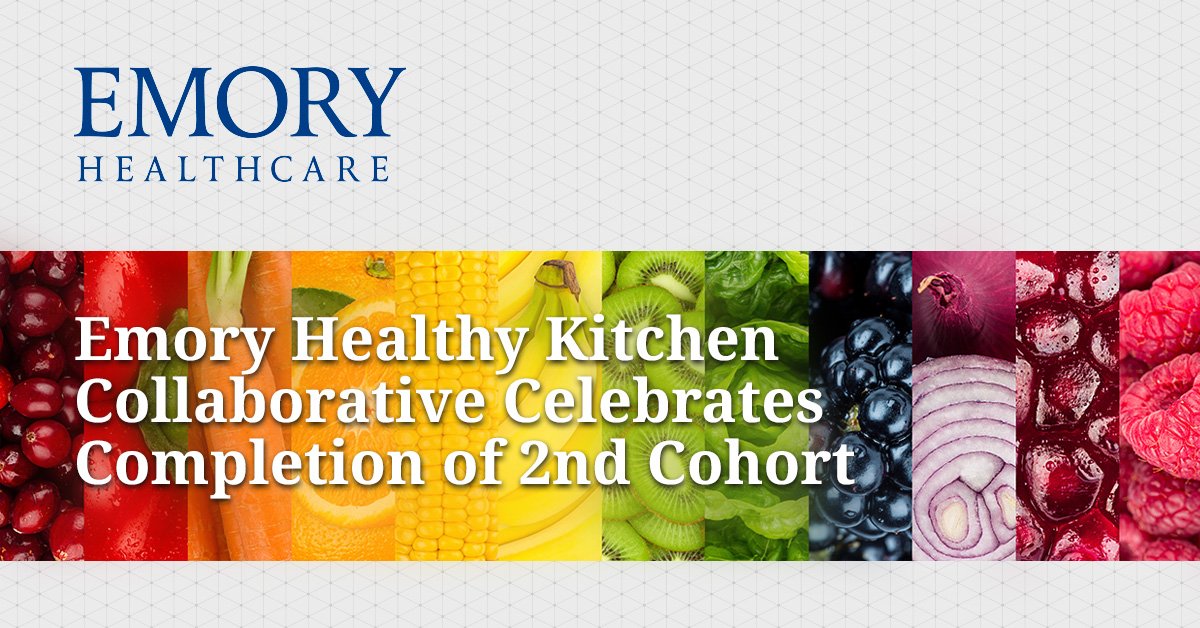Grantee Emory Healthy Kitchen Collaborative Celebrates Completion of 2nd Cohort with Reunion Walk
The following post, by Krystyna Rastorguieva, MPH, is provided by AIH grantee Emory Healthy Kitchen Collaborative. Read on for an update on their progress.
Group photo of EHKC participants and staff
A Saturday walk in the sun a few weeks ago was a special celebration. For some – it was an affirmation of new beginnings as they stepped into their healthier and happier selves. For others – it was a symbol of commitment to continuing the journey they started two years ago. Others yet – a celebration of the successful implementation of another lifestyle and behavior-change program.
The walk was in honor of the now annual Emory Healthy Kitchen Collaborative (EHKC) Reunion. The EHKC program started in 2019, with a grant from Ardmore Institute of Health allowing the first cohort of 38 Emory employees to participate in an in-person program. The EHKC program combined Emory University expert-led lectures in nutrition, movement, ethnobotany, meal-prepping, yoga, and mindfulness, with experiential learning opportunities like teaching kitchens, group exercises, meditation, and mindful eating. The successful 10 week in-person course took place at Emory University Hospital. The COVID-19 pandemic led to the first 12-month reunion in 2020 being held virtually. Funded by a grant in 2021, the team implemented the second EHKC program in a fully digital environment.
“The COVID-19 pandemic challenged us to adapt our program to a virtual format,” says Jon Bonnet, MD the program’s faculty advisor. “We made a number of modifications that allowed us to keep the group experiential components while making the additional content engaging and accessible to participants. Our preliminary data suggests that the virtual program was as effective as the in-person version. I think people valued being able to practice their culinary skills in the comfort of their own kitchens, with the added bonus of getting to share their delicious food with their families and friends.”
Chef Mike Bacha, Executive Chef at Emory University Hospital as well as the EHKC, also reflects on virtual format:
“Even though this was a distance learning platform, I still felt deeply connected to the participants and could feel we were achieving our goal of teaching a skill. I hope the participants enjoy taking these recipes and skills and making them their own in their everyday lives!”
And now the program has come full circle. The second cohort of the EHKC program has completed their 12-month surveys and it was time to reflect and celebrate. Among many factors that make this program unique, Sharon Bergquist, MD, the Primary Investigator for the EHKC clinical trial and Medical Director of Emory Lifestyle Medicine & Wellness program, talks about the power of the group:
“One of the biggest strengths of the EHKC has been the community it has built—the program has brought participants and faculty together that share an interest in wellbeing. The support and encouragement for each other and the program have been incredibly inspiring and rewarding. Human connections and the friendships created are the foundation for wellness. It’s the reason we have made the end of each program year an occasion to reunite with program alumni.”
The team organized two modalities for reunion – a virtual and an in-person one, to be as inclusive as possible. The virtual reunion included reflections and a fun group fitness exercise session.
For the in-person reunion, the group elected to go for a walk in the Lullwater Preserve Park. Participants enjoyed their time in nature as they played a networking bingo game and learned about the plants guided by a walk with Staci Reider, an herbalist. Despite spending many hours in cyberspace interacting and exchanging emails, for some participants, this was the first time they met the staff and other participants in-person.
“I really enjoyed the walk and getting to connect in person for the first time with participants I had only ever met online. Also the addition of the herbalist was so informative and interesting!”, says Kip Hardy, facilitator of the EHKC and a registered dietitian with Emory University Hospital.
Christian Loucks, recent EHKC program participant, also appreciated both, the community and the learning aspects of the activity:
“The reunion nature walk was truly enjoyable because we got connected with our program leaders and other participants in person. I personally learned of many plants and flowers that are in my own yard and have continued to research others because it was so interesting. I have found myself in my yard more since our walk. Thank you so much for the opportunity to learn and grow with you.”
Left to right: Christian Loucks, Inez Efejuku, Andrea Beebe – EHKC Participant
Participants of both cohorts were invited. Andrea Beebe, EHKC first cohort participant shared:
“I went on the reunion walk because I thought I would enjoy reconnecting with people from my cohort, while doing something active and fun out in nature in a part of Emory I had never been. It was quite interesting that so many plants you come across on a simple walk are edible and could be used as a part of a healthy diet.”
Connie Allen, also a first EHKC cohort participant, shared the sentiments about connection and continued learning:
“Even though my clinical trial cohort has ended, my journey to implement what I learned in the Healthy Kitchen Collaborative’s first cohort is ongoing.” Connie also talked about belonging: “Whether a participant in the first cohort, a participant in the second cohort, a program manager or other staff of the clinical trial, or the invited leader naturalist for the session; we all knew we were welcome, specifically invited, and belonged together for the hour. Connecting with others is a healthy habit I am striving to increase. The pandemic significantly weakened this aspect of my well-being.”
In addition to bringing a sense of joy, connection and belonging, the program impacted participants in other profound ways. Inez Efejuku, an EHKC second cohort participant shares:
“Being a part of Emory Healthy Kitchen Collaborative has taught me so much about healthy eating and living. What I learned here is priceless and I will take this information and apply it to my new lifestyle. I have never prepared any meals from a recipe before this class. Chef Mike made it so easy and I was able to prepare my meal just the same as he demonstrated.” She then reflects on the re-union walk: “It was great to be out in nature learning about edible plants.”
And the data gathered during both trials supports and quantifies the impact. Miranda Moore, PhD, Assistant Professor at School of Medicine and Research Advisor for EHKC, who has been instrumental in leading data analysis in the trial, reflects on innovation potential:
“The pandemic forced us to explore new opportunities and innovate to a virtual format. Our preliminary data suggests that a virtual program can be as effective as an in-person program. We hope to keep innovating to make this program as empowering and accessible as possible.”
Photo, left to right: Miranda Moore, PhD; Sharon Bergquist, MD; Krystyna Rastorguieva, MPH
The EHKC team has already published several manuscripts about the rational, design and early findings from the program, as well as its cost. They were recognized at research conferences, and continue to analyze and disseminate results from the programs.
This year, Emory officially joined the Teaching Kitchen Collaborative – an internationally recognized network of thought-leading experts in this field, and the EHKC was invited to present at the American College of Lifestyle Medicine Conference in November 2022.
The team will continue its work on expanding and scaling the program, while also building the community around it, so we can keep learning together.
Connie Allen, inaugural program participant, has expressed it well:
“Scientific knowledge is constantly advancing … Staying in touch with the current Healthy Kitchen Collaborative and past participants provides opportunities to reinforce the parts of my behavior that are going well and to correct my course where I have wandered away from my identity of a person becoming healthier continually.
I like to think of my cohort’s program as ongoing—never ending—just evolving. I appreciate Emory University continuing Healthy Kitchens! Lifestyle medicine in practice makes life better for me.”
Related Grant: Emory Healthy Kitchen Collaborative Virtual Program






